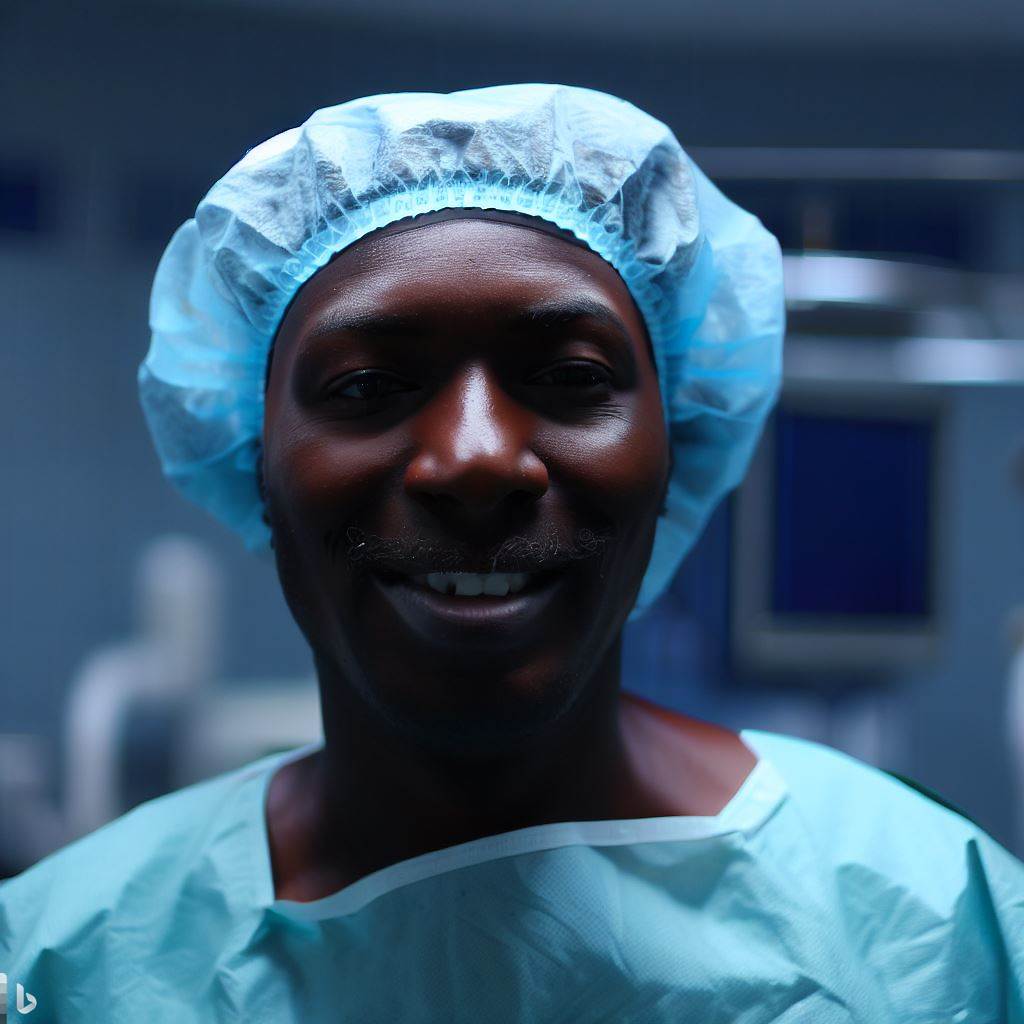Introduction
The State of Surgical Equipment and Facilities in Nigeria is crucial for delivering effective healthcare services.
Surgical equipment and facilities are essential for conducting surgical procedures and ensuring patient safety.
Nigeria’s healthcare system faces numerous challenges, including inadequate infrastructure and limited access to quality surgical equipment and facilities.
Despite the challenges, there have been efforts to improve surgical equipment and facilities in Nigeria.
However, there is still a significant need for investment and improvement in this area.
Without adequate surgical equipment and facilities, the healthcare system in Nigeria cannot effectively meet the needs of the population.
Lack of proper equipment and facilities can lead to delays in surgeries, increased risks for patients, and compromised outcomes.
Improving surgical equipment and facilities can help reduce morbidity and mortality rates in Nigeria.
Furthermore, it can enhance the capacity of healthcare professionals to deliver timely and quality surgical interventions.
Investments in surgical equipment and facilities can also attract skilled surgeons and medical professionals to practice in Nigeria.
In the end, ensuring the availability and functionality of surgical equipment and facilities is crucial for improving healthcare in Nigeria.
Efforts should be made to address the existing gaps and enhance the surgical infrastructure to meet the population’s healthcare needs.
Current challenges in surgical equipment and facilities in Nigeria
The state of surgical equipment and facilities in Nigeria is plagued by numerous challenges.
These obstacles hinder the country’s ability to provide effective surgical care and negatively impact patient outcomes. Addressing these issues is crucial for improving healthcare delivery in Nigeria.
Lack of adequate infrastructure
Nigeria faces a significant shortage of well-equipped and functional surgical facilities, hindering the delivery of quality healthcare.
One major challenge is the lack of adequate infrastructure. Nigeria suffers from a scarcity of well-equipped and functional surgical facilities.
Many healthcare centers lack the necessary infrastructure to perform complex surgical procedures, leaving patients with limited options and potentially compromising their health.
Insufficient supply and maintenance of surgical equipment
There is a scarcity of essential surgical instruments and a lack of proper maintenance, leading to substandard surgical care.
Another pressing issue is the insufficient supply and maintenance of surgical equipment. There is a scarcity of essential surgical instruments, making it difficult for healthcare providers to deliver optimal care.
Additionally, the lack of proper maintenance further exacerbates the problem, leading to malfunctioning equipment and substandard surgical outcomes.
Inadequate funding for healthcare
The healthcare sector in Nigeria suffers from a lack of funds, making it challenging to fund the procurement and maintenance of surgical equipment. Inadequate funding for healthcare is a recurrent problem in Nigeria.
The healthcare sector receives limited financial resources, making it challenging to allocate funds for the procurement and maintenance of surgical equipment.
The limited funding also affects the training and education of healthcare professionals, impeding their ability to provide quality surgical care.
Lack of skilled professionals in surgical care
There is a shortage of skilled surgeons and healthcare professionals trained in surgical care, affecting the quality of surgical procedures.
Furthermore, there is a shortage of skilled professionals in surgical care. Nigeria faces a deficit of trained surgeons and healthcare professionals proficient in surgical procedures.
This scarcity hampers the availability and accessibility of surgical care, particularly in remote and underserved areas. To overcome these challenges, various steps must be taken.
Firstly, the government should prioritize investment in healthcare infrastructure. Building and upgrading surgical facilities with state-of-the-art equipment will enhance the quality of surgical care nationwide.
Secondly, there should be a concerted effort to ensure a continuous supply of surgical equipment and adequate maintenance.
Regular assessments and inspections of equipment should be conducted to identify and address any issues promptly.
Moreover, increased funding for healthcare is essential. The government should allocate a sufficient budget to the healthcare sector, specifically targeting the procurement and maintenance of surgical equipment.
Additionally, funding should be allocated for training skilled surgeons and healthcare professionals to ensure a competent surgical workforce.
Lastly, measures should be implemented to attract and retain skilled professionals in surgical care.
Offering incentives, scholarships, and career development opportunities can help address the shortage of skilled surgeons and healthcare professionals in Nigeria.
Overall, the state of surgical equipment and facilities in Nigeria is fraught with challenges.
By addressing the lack of infrastructure, inadequate supply and maintenance of equipment, insufficient funding, and shortage of skilled professionals, Nigeria can improve its surgical care and enhance healthcare delivery for its population.
Read: Challenges Faced by Surgeons in the Nigerian Healthcare Sector
Impact on Patient Care and Outcomes
- Delayed and canceled surgeries: Patients may experience delays or cancellations of their surgeries due to inadequate surgical equipment and facilities.
- Increased risk of infections and complications: Without proper equipment and facilities, the risk of infections and complications during surgeries may be higher.
- Limited access to specialized surgeries: The lack of quality equipment and facilities may limit patients’ access to specialized surgeries, forcing them to seek treatment elsewhere.
- Higher healthcare costs for patients: Inadequate surgical equipment and facilities may lead to longer hospital stays and additional medical interventions, resulting in higher healthcare costs.
Delayed and Canceled Surgeries
Insufficient equipment and facilities can cause surgeries to be delayed or canceled, negatively impacting patient care.
Patients may experience prolonged pain and discomfort while waiting for rescheduled surgeries. Delays in surgeries can also lead to progression of diseases or worsening of conditions.
Patients may need to make additional arrangements and adjustments to their schedules and lives due to canceled surgeries.
Increased Risk of Infections and Complications
Inadequate sterilization equipment can increase the risk of surgical site infections. Poorly equipped operating rooms may lack proper ventilation, leading to an increased risk of airborne infections.
The lack of advanced monitoring systems may result in delayed detection of complications during surgeries. Insufficient surgical instruments can lead to surgical errors and potentially life-threatening complications.
Limited Access to Specialized Surgeries
Patients requiring specialized surgeries may need to travel long distances or seek treatment abroad. Lack of specialized equipment and facilities in Nigeria may result in delayed or inadequate treatment for patients.
Limited access to specialized surgeries can lead to disparities in healthcare outcomes for patients.
Patients with complex medical conditions may face challenges in finding appropriate healthcare solutions within the country.
Higher Healthcare Costs for Patients
Delayed surgeries can lead to increased hospital stays, medication costs, and additional diagnostic procedures.
Patients may need to seek treatment from private healthcare providers, leading to higher out-of-pocket expenses.
Inadequate surgical equipment and facilities may require patients to undergo repeated surgeries, adding to the overall healthcare costs.
Patients may be compelled to seek treatment abroad, incurring significant travel and accommodation expenses.
In a nutshell, the state of surgical equipment and facilities in Nigeria has a profound impact on patient care and outcomes.
Delayed and canceled surgeries, increased risk of infections and complications, limited access to specialized surgeries, and higher healthcare costs are all consequences of inadequate resources.
Urgent attention and investment are necessary to improve the surgical infrastructure and provide better healthcare services to the Nigerian population.
Read: Exploring the Educational Pathway to Surgery in Nigeria
Initiatives and Efforts to Improve Surgical Equipment and Facilities in Nigeria
Nigeria, like many other developing countries, faces significant challenges in the state of its surgical equipment and facilities.
However, several initiatives and efforts have been put in place to address these issues and improve the healthcare system.
Government Policies and Reforms
The Nigerian government has implemented policies and reforms to enhance surgical equipment and facilities.
These policies aim to improve access to quality equipment and ensure the proper maintenance of existing facilities.
There is a focus on regulatory frameworks to ensure the safety and effectiveness of surgical equipment.
Partnerships with International Organizations
Nigeria has established partnerships with international organizations to leverage their expertise and resources. These partnerships facilitate the procurement of advanced surgical equipment and technology.
International organizations also provide technical assistance in capacity-building and training programs for healthcare professionals.
Training and Capacity-Building Programs for Healthcare Professionals
To address the dearth of skilled healthcare professionals in surgical care, training and capacity-building programs have been initiated.
These programs focus on improving the skills and knowledge of surgeons, nurses, anesthetists, and other healthcare staff.
Efforts are made to enhance both clinical skills and management abilities for better healthcare delivery.
Investment in Healthcare Infrastructure
Significant investments have been made to upgrade healthcare infrastructure, including surgical facilities.
New hospitals, operating theaters, and surgical wards are being built across the country. This infrastructural development aims to provide state-of-the-art facilities and improve patient outcomes.
Improving surgical equipment and facilities in Nigeria is an ongoing process that requires a multi-faceted approach.
Government policies, partnerships with international organizations, training programs, and investment in infrastructure are all vital aspects of these efforts.
With continued commitment and collaboration, Nigeria can make significant progress in enhancing its surgical care capabilities and ultimately improve the overall healthcare system for its citizens.
Read: Evaluating Surgeon Salary Scales across Nigeria

Successful examples of improved surgical equipment and facilities in Nigeria
- Lagos University Teaching Hospital recently installed state-of-the-art operating rooms with advanced surgical equipment.
- Nnamdi Azikiwe University Teaching Hospital upgraded its surgical facilities, resulting in reduced patient waiting time.
- University of Uyo Teaching Hospital invested in robotic surgical systems, enhancing precision and minimizing invasiveness.
- Aminu Kano Teaching Hospital implemented a centralized sterilization unit, improving infection control and patient safety.
- Federal Medical Center, Abeokuta, acquired modern laparoscopic equipment, enabling minimally invasive surgery and faster recovery.
Case studies or examples of hospitals with upgraded facilities
- Garki Hospital in Abuja transformed its surgical department, renovating operating theaters and providing advanced imaging technologies.
- University College Hospital, Ibadan, expanded its surgical space and introduced cutting-edge neurosurgical equipment.
- Federal Medical Centre, Owerri, established a new cardiac surgery unit equipped with the latest cardiac surgical instruments.
- Ajaokuta General Hospital upgraded its facilities, including an anesthesia workstation and a modern surgical instrument sterilizer.
- Jos University Teaching Hospital renovated its surgical ward and integrated innovative surgical navigation systems.
Success stories of enhanced patient outcomes
In a study conducted at University of Port Harcourt Teaching Hospital, improved surgical equipment led to reduced complications.
Patients at University of Maiduguri Teaching Hospital reported quicker recovery times after surgeries performed using advanced equipment.
Enhanced surgical facilities at National Orthopaedic Hospital, Enugu, resulted in improved post-operative rehabilitation outcomes.
University of Calabar Teaching Hospital’s investment in advanced imaging technology facilitated early detection of surgical complications.
Federal Medical Centre, Asaba, achieved higher success rates in complex surgeries thanks to upgraded surgical equipment.
Read: Ethical Considerations for Radiation Therapists in Nigeria
You Might Also Like: The Journey from Medical School to Practice in Nigeria
See Related Content: Promoting Healthy Eating: The Nigerian Dietitian’s Task
Innovations in surgical equipment technology:
The introduction of robotic-assisted surgery has revolutionized procedures in some Nigerian hospitals, improving precision and reducing invasiveness.
Advancements in endoscopic equipment have enabled more accurate and less painful diagnostic and therapeutic procedures.
Ultrasound-guided surgery is becoming more common, allowing surgeons to visualize and navigate during minimally invasive surgeries.
3D printing has enabled the creation of patient-specific surgical instruments and implants, enhancing surgical accuracy.
Intraoperative imaging systems have improved real-time visualization, aiding surgeons in achieving better surgical outcomes.
By continuously upgrading surgical equipment and facilities, Nigeria’s healthcare sector is improving patient outcomes and advancing surgical techniques.
These successful examples, case studies, and innovations in surgical equipment technology highlight the country’s progress in providing quality healthcare services.
Future Prospects and Recommendations
The state of surgical equipment and facilities in Nigeria has shown significant progress over the years, but there is still much work to be done.
In order to improve the current situation and provide better healthcare services, it is crucial to focus on various aspects.
This blog section will discuss the future prospects and provide recommendations on sustaining and enhancing the state of surgical equipment and facilities in Nigeria.
Importance of Sustained Investment in Healthcare
Sustained investment in healthcare is essential for the improvement of surgical equipment and facilities in Nigeria.
Adequate funding will enable the government to upgrade existing facilities and purchase modern surgical equipment. This investment is necessary to meet the growing demand for quality healthcare services.
Furthermore, sustained investment will attract more qualified professionals to the healthcare sector.
It will create a conducive environment for both local and international surgical experts to work in Nigerian hospitals and clinics, thus elevating the overall standard of care.
Need for Public-Private Partnerships in Healthcare Infrastructure Development
Public-private partnerships (PPPs) play a crucial role in developing healthcare infrastructure in any country.
Nigeria should explore opportunities for collaboration between the government and private entities to improve surgical equipment and facilities.
By partnering with private organizations, the government can leverage their expertise and resources to build state-of-the-art surgical centers.
These partnerships can also help in training surgical professionals and promoting knowledge exchange between public and private institutions.
Importance of Continuous Training and Development for Surgical Professionals
Continuous training and professional development are vital for surgical professionals in Nigeria. Regular workshops and courses will equip them with the latest surgical techniques and advances in technology.
This will enhance their skills and ensure the delivery of high-quality surgical care.
Additionally, the government should encourage surgical professionals to participate in international conferences and collaborate with renowned surgeons.
Such exposure will broaden their knowledge and enable them to implement best practices in their daily practice.
Leveraging Technology for Improved Surgical Equipment and Facilities
Technological advancements have revolutionized the healthcare industry, and Nigeria needs to embrace these innovations.
Investing in modern surgical equipment and facilities will facilitate safer and more efficient surgeries.
From robotic-assisted surgeries to advanced imaging systems, technology can greatly enhance surgical outcomes.
It is crucial for Nigeria to prioritize the integration of technology in surgical practices and ensure regular maintenance and upgrades to keep up with advancements.
The future of surgical equipment and facilities in Nigeria holds great promise.
Sustained investment, public-private partnerships, continuous training, and leveraging technology are key areas that need attention to improve the state of surgical care.
By focusing on these aspects, Nigeria can move towards a healthcare system that offers first-class surgical services to its population.
It is imperative for the government, healthcare professionals, and stakeholders to collaborate and work towards a common goal of ensuring better surgical equipment and facilities in Nigeria.
With sustained efforts, Nigeria can bridge the gap and provide its citizens with access to high-quality surgical care.
Read: Occupational Therapy Schools: Where to Study in Nigeria
Conclusion
Recap of the state of surgical equipment and facilities in Nigeria
The state of surgical equipment and facilities in Nigeria is currently inadequate and poses significant challenges for healthcare providers and patients.
Hospitals lack the necessary equipment and resources to provide optimal surgical care, leading to substandard outcomes and increased risks for patients.
Insufficient funding, lack of maintenance, and outdated technology contribute to the poor state of surgical equipment and facilities.
Call to action for stakeholders and policymakers
Stakeholders, including government officials, healthcare professionals, and private sector organizations, must collaborate to address the issues plaguing surgical equipment and facilities in Nigeria.
Increased investment in healthcare infrastructure, improved funding allocation, and policies that support equipment maintenance and upgrades are essential.
Highlighting the potential for improvement and better patient care:
Investing in modern surgical equipment and facilities will significantly enhance patient outcomes, reduce complications, and improve overall healthcare services in Nigeria.
By prioritizing the improvement of surgical equipment and facilities, Nigeria can elevate the standard of healthcare and attract skilled professionals.
Better patient care will not only benefit individuals but also contribute to the economic growth and development of the country.




